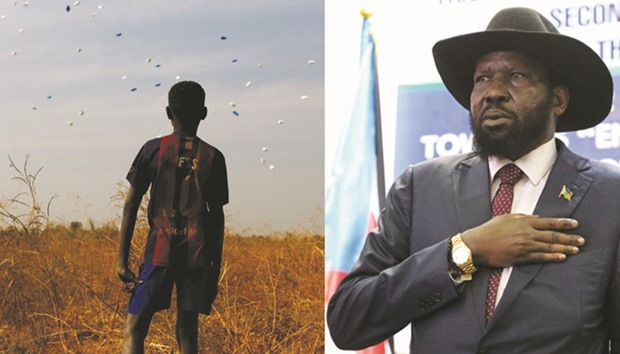South Sudan’s President Salva Kiir has promised aid agencies safe access to hunger-stricken civilians, a day after his government declared a famine in parts of the war-ravaged country.
South Sudan has been mired in civil war since 2013 and the United Nations said on Monday that it was unable to reach some of the worst hit areas because of the insecurity.
“The government will ensure that all the humanitarian and developmental organisations have unimpeded access to the needy population across the country,” Kiir said in a speech to parliament.
The government was also taking its own steps to help people threatened by famine, Kiir said, pledging to increase food supplies and to subsidise their prices in affected areas.
Nearly half of South Sudan’s 11mn people will lack reliable access to affordable food by July, the government predicts, because of the fighting, drought and hyperinflation.
South Sudan has been hit by the same east African drought that has pushed Somalia back to the brink of famine, six years after 260,000 people starved to death in 2011.
The UN children’s agency Unicef said yesterday that nearly 1.4mn children were at “imminent” risk of death in famines in South Sudan, Somalia, Yemen and Nigeria.
South Sudan is rich in oil resources.
But, six years after independence from neighbouring Sudan, there are only 200km of paved roads in a nation the size of Texas.
In the fighting, food warehouses have been looted and aid workers killed.
The conflict has increasingly split the country along ethnic lines, leading the United Nations to warn of a potential genocide.
The medical charity Medecins Sans Frontieres (MSF) said it had set up an emergency intervention in northern Mayendit county to help malnourished children.
One in four children in Mayendit had acute malnutrition, MSF said.
“Providing healthcare is a major challenge in such a dangerous context: people are constantly moving to seek safety,” MSF said on Twitter.
In some parts of the country farming has been hampered and food prices have soared since a military conflict erupted between Kiir and his former deputy, Riek Machar, in December 2013.
The UN mission to South Sudan said last week that soldiers had prevented peacekeepers from carrying out a foot patrol to Wau Shilluk in the north to check on the situation of about 20,000 people who had fled fighting.
The peacekeepers wanted to check if the displaced people needed assistance, UN mission head David Shearer said in a statement.
Throughout the conflict, aid workers have complained of bureaucratic obstacles, checkpoints where government or rebel troops demand payments from aid convoys, looting of compounds, and even rape and killings of humanitarian workers.
Meanwhile, the European Commission announced an €82mn ($86mn) emergency aid package for South Sudan, which will be used to meet the most urgent needs in the country and assist neighbouring countries manage the influx of refugees.
Christos Stylianides, EU commissioner for humanitarian aid management, said yesterday that the “humanitarian tragedy” in the country was “entirely man made” and called for urgent action to prevent more deaths.
“Crucially what matters is that all parties allow humanitarian organisations to have immediate and full access to do their job and deliver aid,” he said.
South Sudan’s military conflict has killed tens of thousands and displaced 3.4mn people.
The formation of a unity government in April 2016 did not prevent fighting from starting again a few months later.
In his speech, Kiir pledged to relaunch the dialogue with the rebels, calling it “a key priority for this government”.

LEFT: A boy watches as sacks of food drop to the ground during a United Nations World Food Programme (WFP) airdrop, close to Rubkuai village in Unity State, northern South Sudan. RIGHT: Kiir said the government will ensure that all the humanitarian and developmental organisations have unimpeded access to the needy population across the country.
